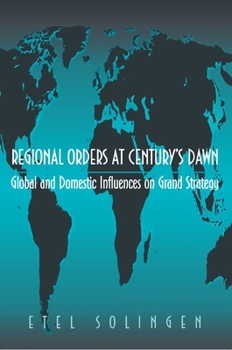Regional Orders at Century's Dawn: Global and Domestic Influences on Grand Strategy
(Part of the Princeton Studies in International History and Politics Series)
Select Format
Select Condition 
Book Overview
Etel Solingen provides a comprehensive explanation of foreign policy based on how states throughout the world have confronted the rapid emergence of a global economy and international institutions. A major advance in international relations theory, Regional Orders at Century's Dawn skillfully uses a key issue--internationalization--to clarify other recent debates, from the notion of a democratic peace to the relevance of security dilemmas,...
Format:Paperback
Language:English
ISBN:0691058806
ISBN13:9780691058801
Release Date:August 1998
Publisher:Princeton University Press
Length:352 Pages
Weight:1.15 lbs.
Dimensions:0.8" x 6.2" x 9.4"
Customer Reviews
1 rating
The best analysis of the causes of war and peace available
Published by Thriftbooks.com User , 16 years ago
Solingen tackles the question of the causes of war in the late 20th and early 21st century by comparing the empirical evidence for competing international relations research programs (realism, democratic peace hypothesis) with her own view, which proves to be not only surprising and intuitively compelling, but well supported by the facts. Briefly, she argues that there are two basic strategies for dealing with globalization (emergence of strong, extensive international markets): embrace or resistance. Both strategies have self-interested factions within their polities competing with each other for control of the state. Coalitions which embrace international markets find that they have cooperating partners in adjacent states with similar motives, and a preponderance of states controlled by such coalitions in a region leads to peace. By contrast, coalitions with self-interested reasons for resisting trade tend to be aligned with military interests (and the ideological groups that support them: secular and religious nationalists) that regard their counterparts in adjacent states as competitors rather than cooperators. Consequently, regions in which trade resistance dominates tend to be regions of war. Solingen's surprising claim is that the degree to which democracy takes hold is irrelevant, thus refuting in advance a central theme of Bush administration policy. The themes of self-interested coalitions, and fundamental choices to compete or cooperate, lend the book an overall "game-theoretic" flavor. And yet the book is wonderfully clear and non-technical. Though her "economics explains politics" methodology sounds vaguely Marxian, (and perhaps discounts the role of culture too much, as the "nationalist-confessional coalitions" need some sense of communal identity rooted in history to organize themselves around), her implicitly classical liberal emphasis on the virtue of markets to bring peace and prosperity, rather than violence and exploitation, is anything but. One of the best books I've read in the past decade.





